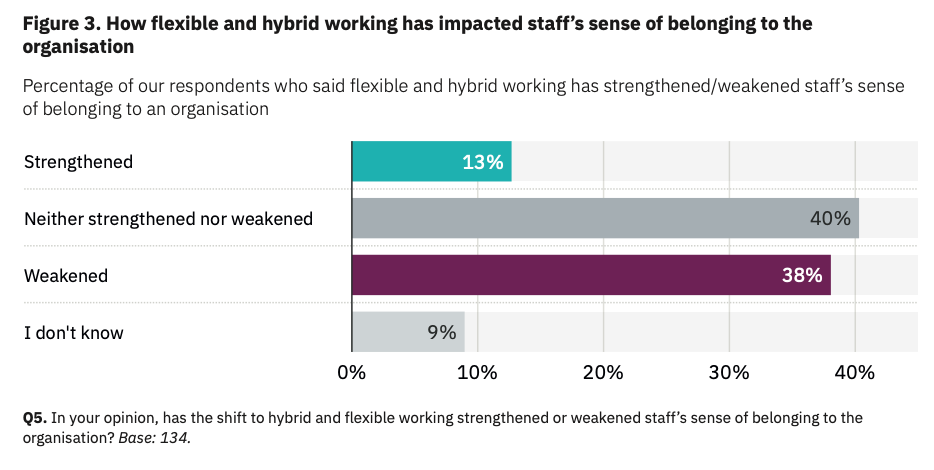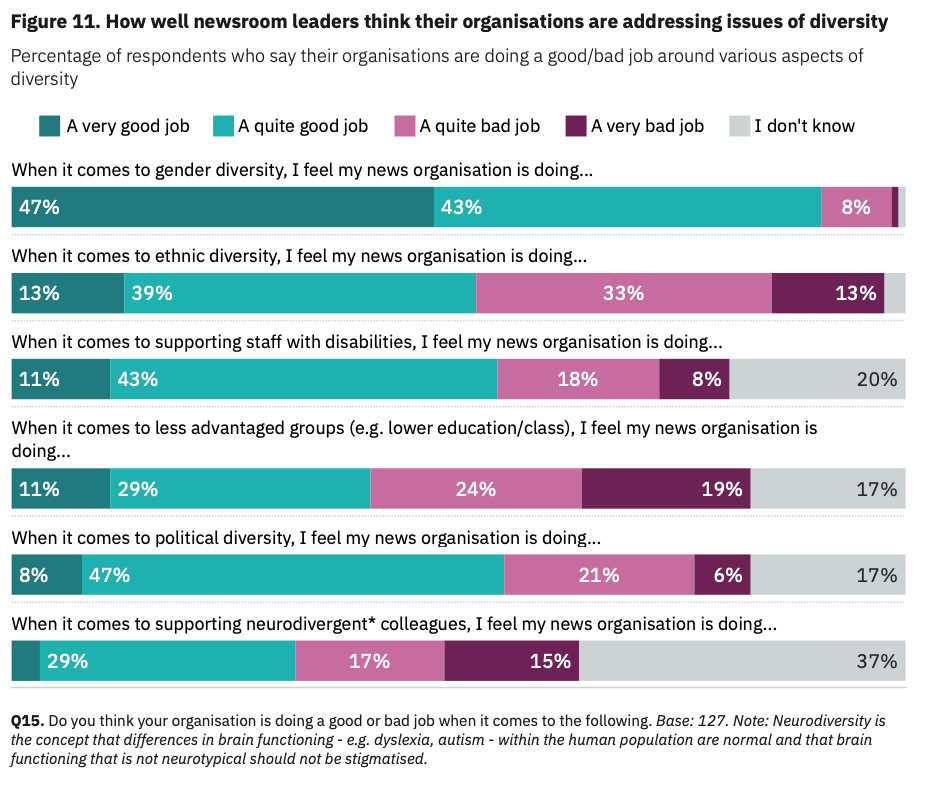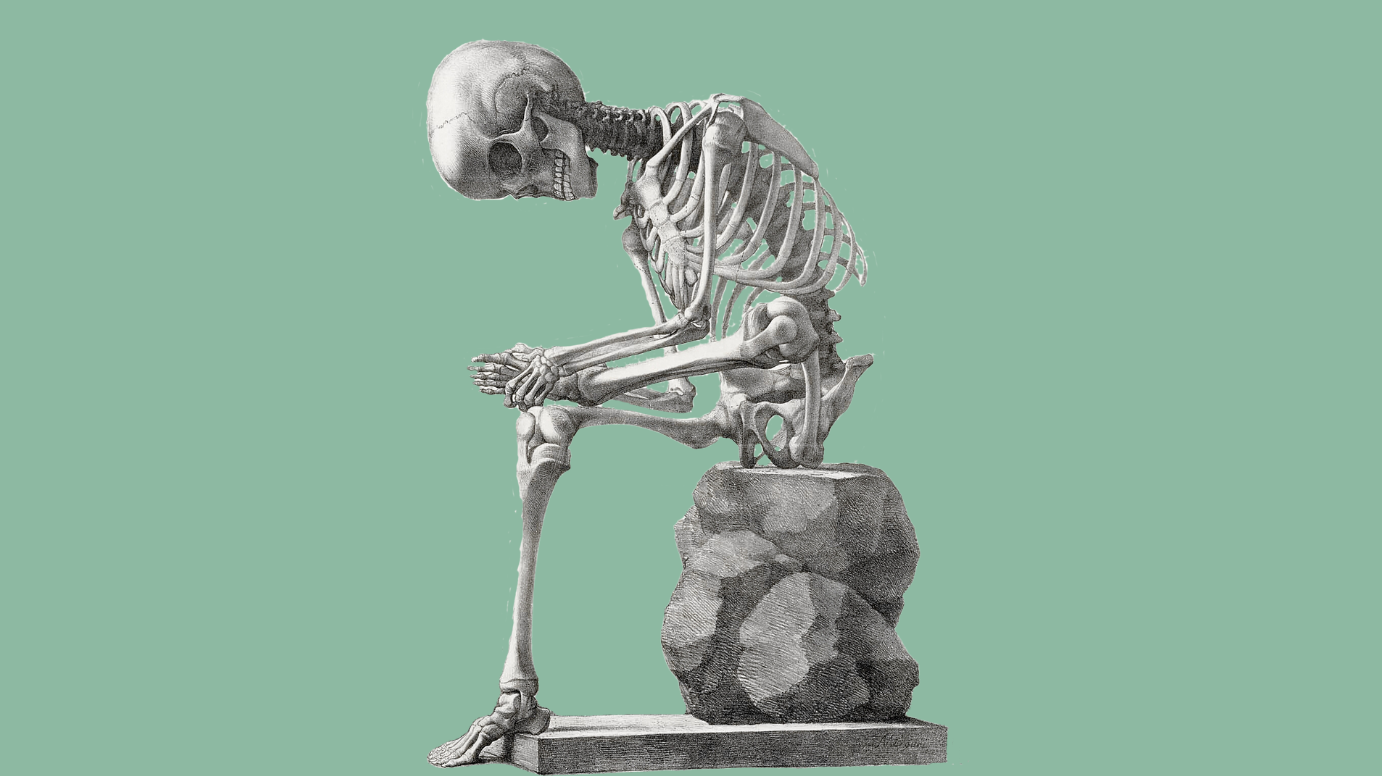
What does a job offer that self-employment does not?
And other thoughts prompted by the Changing Newsrooms 2023 report
And other thoughts prompted by the Changing Newsrooms 2023 report
Minutes ago Federica Cherubini and Ramaa Sharma at the Reuters Institute for the Study of Journalism in Oxford released their Changing Newsrooms 2023 report, a fundamental (and rare) annual piece of research on workplace attitudes in the news business. Just my jam. I had just a brief moment to take advantage of the embargo Federica kindly granted me, so here's a quick and dirty look at highlights from the research and the questions they raise for me. Deeper analysis will no doubt follow.
But first, a note on the methodology: this research is based on survey responses from 135 senior news leaders in 40 countries and 10 in-depth interviews. The results are not reality exactly; they're some bosses' perception of reality. You'll see why I keep that in mind.
The death of the newsroom makes employment look more and more like self-employment
Only 16% of respondents say their workplace has largely returned to pre-pandemic working standards with almost everyone in the office most of the time. For two-thirds, new hybrid models and rules are in place, with varying levels of flexibility. Contrary to what breathless headlines would have you believe, for the overwhelming majority of bosses lesser office presence hasn't created an issue of productivity, but one of belonging.

Staff jobs theoretically have two advantages over self-employment – stability of income and belonging to a team. For those things we forego some of our independence, scheduling flexibility and peace of mind. We often put up with uninspiring managers and strategies we're not quite sure we follow. We may renounce bigger creative dreams and potentially higher earnings. We hand in our freedom to belong to something bigger and be spared the hustle. That's the social contract.
Stability is an increasingly empty promise. With news industry layoffs breaking records every year – who knew there were that many jobs left to lose? – my Millennial peers (and others probably) don't see full-time employment as any kind of guarantee. Even when they have it, they're careful to build their own email list and portfolio of freelance activities. That doesn't spare them the internal hustle –it's hard work being kept off the redundancy list year after year. And it's not always enough.
What of belonging? That's what briefly drew me out of self-employment last year – the pull of human connection and a shared mission. But how do you build camaraderie when your colleagues are just avatars on Slack? How does a leader communicate not just to-dos, but a vision? How do you create something that's real in people's lives when their only window into it is a 13-inch screen? In the 2010s I ran a thriving global team of 30 editors who never sat in the same country as I did. It can be done, but many organisations haven't put in the effort. They don't know how and they haven't dedicated the time or money. (Yes, it needs a budget. Remote work is not a cost-cutting technique.) Without a conscious effort on culture, remote work can quickly descend into an endless succession of tasks without a sense of the bigger mission, without human connection and without, dare I say it... fun.
You can't put the genie back in the bottle: People want flexible work. But it's making the line between staff and self-employment increasingly blurry, and employers need to be able to answer this question: What are we offering that makes it worth someone giving up their independence?
News orgs still mostly have no clue what AI will do – but it'll save them, right?
This is probably not good for my career, but I have to say it: The AI conversation bores me. It's in the report so I'll entertain it: 74% of respondents say generative AI will help improve workflows and processes, 21% say it will bring more fundamental change to every role in the newsroom, and 2% call it overhyped. Only 3% bravely admit to not having the answer yet. (Hi, I see you.)
Some of the long-form answers gave me pause:
I hope it will make some things easier and more automatic...
Generative AI will help us produce better articles, identify audience needs and wants, replace some redundancies...
(Generative AI) can help to do some tasks more efficiently, to scale up content distribution and to assist journalists in some parts of their tasks...
None of these things require AI. They require editorial to respect product and engineering as equals. They require redesigning jobs that have barely changed since we built newspapers with scissors and paste. They require placing audience needs at the centre of all we do. This is the pivot to video all over again: We seem to think a tool is a strategy. I'm no Luddite, I've been editing my podcasts with AI for four years, but it's a means to an end. Drop AI on an inefficient workflow and a broken culture and you just have one more way to do the wrong things. Culture, then strategy, then tools. We're taking the problem from the wrong end once again.
Are 90% of news orgs really doing well on gender diversity?
It's too late in the night and the topic is too important for me to comment at length on the third part of the research, on culture, diversity, inclusion and belonging. On these topics, I find the view of employees matter far more than any impressions from the top. But when 9 out 10 of these newsroom leaders think we're doing a good or quite good job on gender diversity, I'm calling it mass delusion. (And yet I acknowledge more than half the respondents are women and know what they're talking about.) My anecdotal evidence is only that, but senior women around me are dropping like flies out of the industry, exhausted by years of trying to change the culture and hitting walls. I don't see it. Do you?

You can find the full report, Changing Newsrooms 2023: Media leaders struggle to embrace diversity in full and remain cautious on AI disruption, authored by Federica Cherubini and Ramaa Sharma, here on the website of the Reuters Institute for the Study of Journalism.
Hey, you read to the end!
Don’t miss future articles like this one; let me into your inbox.







